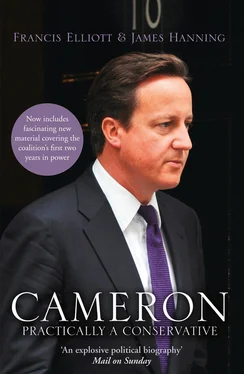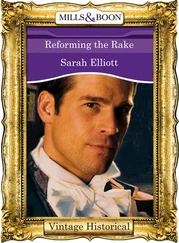Donald Cameron did not cope well with having a disabled son, and it has been said he did not encourage Ian to believe that he would be joining him at Panmure Gordon, where he was a senior partner. Had the father seen more of his son at Eton he might have revised his opinion. Ian Cameron did not shine academically at school, but his peers learned not to underestimate his determination. A lifelong friend Ben Glazebrook remembers playing a rumbustious game of indoor football in a corridor at Eton. ‘I had the ball at my feet…and I said “Oh yes, this is Ian, I can get past him.” Suddenly my wrists were seized in an iron grip by Ian, because all the strength of his legs had gone into his arms and wrists. I virtually needed a course of physiotherapy after that. He had this amazing strength, and he was always incredibly resilient, courageous and outgoing. He’d never been shy, and he was always very open. He said, “I can do everything except ski,” which I think he regretted.’ He also enjoyed cricket and tennis, and at Eton, when he took part in the Field Game, the school’s own soccer–rugby hybrid, he played in a position comparable to scrumhalf, where, on occasions, a low centre of gravity can be an advantage.
Leaving school in 1951, Ian Cameron made a decision he later came to regret. Perhaps conscious of the need for a remunerative career, instead of going to university he decided to train as an accountant. While professionally useful, he found it less than entertaining (and was to forbid his children to enter the profession). Having qualified, he spent two years as a banker at Robert Fleming before joining Panmure Gordon, where he worked exceptionally hard to overcome the stigma that some had attached to his physique, and in 1957 emulated his father and grandfather in becoming a partner. He was, he admitted privately, a ‘nepotistic heir’. Socially Ian Cameron was no less determined to triumph over his disability. He moved out of his mother’s house in Lowndes Square, near Harrods, into a flat of his own round the corner in Basil Street. ‘Ian was always incredibly social,’ remembers Glazebrook, who lived near by. ‘He used to have endless parties with the most beautiful girls.’
In 1958 Donald Cameron died, leaving an estate valued at £57,408 (worth £928,000 today) and an inheritance that enabled his son to consider marriage. When the charming Mr Cameron set out to woo her, Mary Mount saw not deformity in him but spirit. He threw himself around the dance floor with the same gusto with which he had played football. The couple married on 20 October 1962, two days before Mary’s twenty-eighth birthday. It might have surprised his father that Ian Cameron married so well, into a family that has belonged to the British Establishment since long before that phrase was coined. Tall, stately and sure of herself, Mary is a typical Mount. From the beginning she had two qualities that her friends and family most admire in her now – compassion and common sense – and she is typical too for having served as a magistrate for over thirty years, as her mother and grandmother did before her.
The patrician spirit of the Mounts is neatly captured in a story about David Cameron’s great-great-great-grandfather William Mount, an MP (then unpaid) for an Isle of Wight seat and a man of some wealth. He employed a young boy – whose father had died – as a bird-scarer in his fields, and presented the boy with a book (‘the first book I had ever owned’). The boy remembered the gesture and in later life wrote gratefully to Mount’s son, William George Mount: ‘You will always be a means of doing good and exerting influence in quarters as unexpected as in my case.’
‘W.G.’, as he was known, was a barrister, ‘gentleman and landed proprietor’ (of Wasing Place, Berkshire), and became MP for Newbury. Perhaps the most formidable of the Mount ancestors, like most MPs at the time he had little truck with godlessness. In 1851 the family invited Samuel Wilberforce, the Bishop of Oxford, to stay. He, famously, was a vigorous opponent of Darwin’s theories of evolution and was later to cross swords with T. H. Huxley at a meeting of the British Association when he provocatively asked his opponent whether it was from his grandmother or his grandfather that he claimed descent from a monkey. In the 1880s, W.G.’s eldest daughter Elizabeth, every bit as devout as her father, took a weekly Bible class, which was attended by the groom’s boy, the schoolroom maid, the upper laundry maid, the laundry maid and the house, kitchen and scullery maids, as well as the butler, doorman and members of the Mount family. Staff were obliged to attend, and were excused only when beaters were needed for a shoot.
According to the 1880 census, W.G., by then running the Wasing estate, employed thirty-two men to look after his 500 acres and a further fifteen servants to staff the house and attend to his six young children. One of these children was William Arthur Mount (educated at Eton and New College, Oxford, and also a barrister), who in 1900 succeeded his ailing father, unopposed, as Conservative MP for Newbury, before losing it to the Liberal candidate six years later. ‘Billy’ worked diligently and regained the seat in 1910, frequently speaking out against Home Rule for Ireland, until he stood down twelve years later. He continued in public life as chairman of Berkshire County Council and as chairman of the South Berkshire Hunt. He was made a baronet in June 1921 and died in 1930 at the age of sixty-four. He had three sons, the eldest of whom, William Malcolm Mount (the second baronet, known as Bill), succeeded to the title at the age of twenty-six.
‘W.M.’ was David Cameron’s grandfather. He too was educated at Eton and New College, Oxford, where he played cricket with Alec Douglas-Home, later to become Prime Minister. He was a keen fisherman and horseman and became joint master of the South Berks hounds and chairman of Newbury Conservative Association. He had three daughters, the middle of whom, Mary, was born in 1934. As a lieutenant colonel he fought impressively in the war with the 61st Reconnaissance Regiment (Royal Armoured Corps), but was invalided out, having been shot in the thigh the day after D Day. His wife Lady Nancy was also active, taking a leading organisational and welfare role in the Women’s Land Army, a loosely structured band of 200,000 women who worked ploughing, dung-spreading and threshing. During the war, the young Mary, her two sisters and mother moved out of the big house at Wasing, which was to be used by evacuees from London, to a neighbouring farm. In February 1945, Wasing Place was virtually burned to the ground and many works of art were lost. Two years later, possibly in part to help pay for the restoration, W.M. placed over a thousand acres of family land at Thatcham on the market. Mary’s mother Nancy took a prominent role in the rebuilding of Wasing Place, and eventually she and her husband returned to the house that the Mount family had owned for nearly 200 years.
In 1947, William Mount served as Sheriff of Berkshire, the fourth Mount in 170 years to hold the title. He was also president of the Newbury Show, a governor of the Royal Agricultural College at Cirencester and served on the Council of the County Landowners Association, which enabled him to sustain his interest in timber. He was also appointed Berkshire County Scout president and originated the Berkshire Supporters of Scouting, which raised money for Scout troops, as well as opening up the Wasing estate for use by Scout camps. In 1952, in a comparable act of public-spiritedness, ‘Lieutenant Colonel Sir’ William Mount took command of the 3rd South Berkshire Home Guard, which aimed to afford some protection to the civilian population in the event of a nuclear attack. The proximity of Aldermaston, the home of Britain’s nuclear weapons, and the political protests that accompanied its setting up in 1950, may have had a good deal to do with that.
Читать дальше












